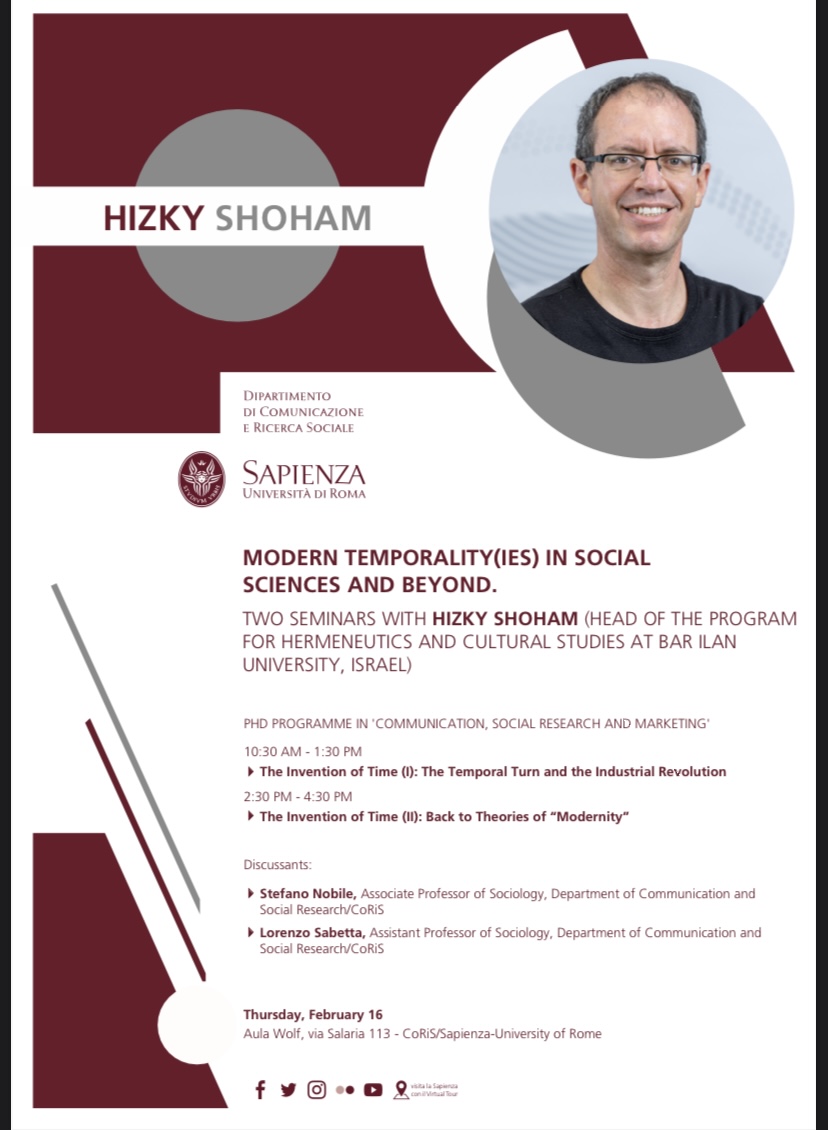On 16th February 2023 in department of Communication and Social Research of University La Sapienza of Rome there was a seminary on Modern Temporality(ies) in social sciences and beyond, taken by Hizky Shoham, head of the program for hermeneutics and cultural studies at Bar Ilan University, Israel.
He started talking about the time studies, which support an idea of time as a social construction and the existence of different time perceptions in different cultures, reflected in the different ways of time as social interactions between individuals and groups.
In particular time doesn’t exist as an object but it’s a process, so it doesn’t exist as a noun but as a verb.
The question consists in whether or not we can speak about different societies exist in different stages of the process of temporality?
The concept of evolution is a characteristic of modern time perception, which merge in the concept of epocality, considered as the understanding of modernity and its basic characteristic, based on the thinking of Blumenberg in “The legitimacy of modern age”. Consequently the modernity is a perspective of self-understanding and also an era, considered as a period of time, characterized by the logic of comparison with previous eras, like middle age and ancient age.
In addition there are differences between the concepts of evolution.
In particular Marx consider it as teleological concept, which has a purpose: the social order; he thinks also that there is a clear distinction between the present and the past, but this is wrong because time is constantly moving.
Instead Blumenberg has a perspective of temporal self-understanding which brings to the concept of temporalization, based on which the identity of groups are constructed on temporal exist, and it includes past, present and future, which defines people by their storicity.
But here there is a paradox in the way modernity’s self-understanding creates a social order, because it increase fragmentation of time that at the same time takes to a stable concept of time. Infact the acceleration of time creates a need of calm and slow down, so these both sides are temporalizations lived by the identity of individuality.
Also Koselleck talks about different perceptions of temporality, which have equals by other cultures. Infact time depends by the perception of the specific individual, that brings to the multiplication of time and the paradoxal conclusion of intemporality, where present is the measure of things and there is a constant evolution, which creates time felt like a process that pass. So there are many time perceptions not unidirectional but multidirectional, with its multiplication and diversification.
So now the question consists in how can we take the temporalization of modern life and use it to describe the modern culture?
Modern things are all characterized by the fact that we need them in the present moment, so we can say that the present is the measure of things.
Also the great consideration of mortality characterizes modernity because there is a greater attention to individual life and its time, ie its duration.
At the end he talks about 2 topics: the tradition and rituals.
The tradition is considered now stereotypical, but in XIX century social sciences used the term “tradition” to describe the society in a more analytical way.
Infact Weber talks about it as the habituation of long practice, so traditional oriented social actions aren’t properly social actions because they are meaningless and bring to a stereotypical thinking.
But he didn’t give a theory of tradition to understand it, as an active act of deliver and give something to someone, according to the latin meaning “trado”, etymological term of “traditio”, which includes an empiric consideration.
Now we can say that traditional society doesn’t exist because it’s a fantasy of modern society, which uses the term of tradition as an identity definer of past society. This is based on the idea of the need to create a temporal continuation to have an identity, which is typical of modern society and is desired by everyone.
The rituals are the reflection of the way modernity created a social order based on the idea of constant evolution.
We can check it through rituals, considered as Durkheim:
-Religious rituals like lifecycle rituals, as marriage, and holidays, as Christmas;
-Non-religious rituals, which are rights of temporality that marks the pass of time.
In XIX century the disconnection from nature and the urbanization have caused the need to synchronize large systems, like trains and telegraphs, from different places. In particular Gregorian calendar was disseminated to all over the world with globalization and the clock started to organize life from the industrial revolution, where the time became an instrument of life meaning.
So in the industrialization process in every culture, the birthday became a practice of worshipping time in a modern way, historicized and mathematicised.
Infact now time is the most important god, who is indifferent to the needs of people in front of everyone are equals, and is the most eminent meaning maker of modern society.
Also the globalization is the conventionalization of time, which is a unidirectional process of temporality because of a common idea of time.
Infact in modern society we sustain the existence of history, the idea that nobody lives out of time, the efficient use of time in order to organize time in a synchronized way with conventions, and also the time poverty, because of more temporality and less time, differently from the past.


